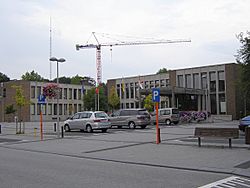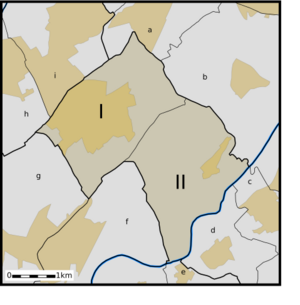De Pinte facts for kids
Quick facts for kids
De Pinte
|
|||
|---|---|---|---|

De Pinte town hall
|
|||
|
|||
| Country | Belgium | ||
| Community | Flemish Community | ||
| Region | Flemish Region | ||
| Province | East Flanders | ||
| Arrondissement | Ghent | ||
| Area | |||
| • Total | 17.98 km2 (6.94 sq mi) | ||
| Population
(2018-01-01)Lua error in Module:Wd at line 1575: attempt to index field 'wikibase' (a nil value).
|
|||
| • Total | Lua error in Module:Wd at line 1,575: attempt to index field 'wikibase' (a nil value). | ||
| Postal codes |
9840
|
||
| Area codes | 09 | ||
| Website | www.depinte.be | ||
De Pinte is a town in Belgium. It is located in the province of East Flanders. Before 1868, De Pinte was part of Nazareth.
The municipality includes two main areas. These are De Pinte itself and Zevergem. In 2021, about 10,990 people lived in De Pinte. The total area of the town is 17.78 square kilometers.
Contents
History of De Pinte
The name "De Pinte" comes from an old inn. This inn was called "Het Pijntken". It was located at Pintestraat 69. When De Pinte became a separate town in 1868, it was named after this inn. Before that, it was sometimes called "Little Nazareth".
In the late 1800s, many plant nurseries started here. Later, in the 1900s, these lands were divided up. De Pinte also became a train station. This station connected Ghent to Kortrijk (from 1839). It also connected Ghent to Oudenaarde (from 1857).
The land was once a large open area. It was called Scheldevelde. This land belonged to the Abbey of Ghent Saint-Peter. In the 1700s, a map showed De Pinte as a rural area. It had small villages and country houses. The area where the town center is now was called Pintestraete.
In 1838, plans for a church were approved. The first church was built in 1839. On June 2, 1868, De Pinte became its own municipality. It was no longer part of Nazareth.
The colors of De Pinte are red and white. The flag has red and white halves. It also shows a shield and three gold stars. There are also twelve silver blocks on the flag.
In 1977, the towns of De Pinte and Zevergem joined together. They formed the new municipality of De Pinte. The border of the town was also made straighter. It now reaches the Scheldt river.
Communities in De Pinte
De Pinte municipality has two main communities. These are De Pinte proper and Zevergem. De Pinte proper has more people living in it. However, both areas are similar in size.
The Oudenaardse Steenweg (N60) road often marks the border. It is generally seen as the line between the two communities.
In 2009, De Pinte proper covered 8.85 square kilometers. Zevergem covered 9.13 square kilometers. The total area was 17.98 square kilometers. As of January 1, 2010, the total population was 10,227 people.
|
De Pinte borders the following towns:
|
Transportation
The Oudenaardsesteenweg (N60) road crosses through De Pinte. This road connects directly to the A14/E17 highway.
De Pinte also has a train station. From this station, you can travel directly to Brussels, Kortrijk, De Panne, and Ghent.
Events in De Pinte
Every year, the Sneukeltoer bike race takes place in De Pinte. About 2,300 cyclists join this event. The money raised from participation fees goes to "Kom op tegen kanker". This is a charity that helps people with cancer.
There is also an annual music festival called Zeverrock. It is one of the biggest music festivals in East Flanders. It is held in the Zevergem area.
Famous People from De Pinte/Zevergem
- Katrien Devos, a Flemish actress
- Tine Ruysschaert, a Flemish actress
- Gabriel Ríos, a well-known singer
- Evy Gruyaert (from Zevergem), a TV-host and presenter
- Paul Van Cauwenberge, a former leader of the University of Ghent
Partner City
De Pinte has a partner city:
- Freiamt, in Germany
Gallery
See also
 In Spanish: De Pinte para niños
In Spanish: De Pinte para niños
 | May Edward Chinn |
 | Rebecca Cole |
 | Alexa Canady |
 | Dorothy Lavinia Brown |









